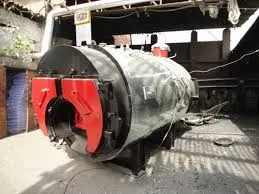
Sep . 05, 2024 03:41 Back to list
hot water boiler heating
Understanding Hot Water Boiler Heating Systems
Hot water boiler heating systems are a popular choice for residential and commercial buildings, primarily due to their efficiency and reliability in providing warmth during colder months. These systems utilize heated water circulated through pipes to radiators or underfloor heating systems, effectively warming living spaces.
How Hot Water Boilers Work
At the heart of a hot water heating system lies the boiler, which heats water using various energy sources, including natural gas, propane, oil, or electricity. The process begins when the thermostat detects that the indoor temperature has fallen below the desired level. The boiler then ignites its fuel source or activates electricity to heat the water.
Once the water reaches the set temperature, it is circulated through a network of pipes. The heated water travels to radiators or convectors in different rooms, radiating heat into the space. As the water cools down, it returns to the boiler to be reheated, creating a continuous cycle of heating.
Types of Hot Water Boilers
There are primarily two types of hot water boilers traditional boilers and combi (combination) boilers
.1. Traditional Boilers These systems typically heat water in a separate tank and store it until needed. This can lead to efficiency losses if the hot water is not used promptly, as the system continues to maintain the water temperature.
2. Combi Boilers In contrast, combi boilers heat water on demand, eliminating the need for a storage tank. This can be more energy-efficient, as it only heats water when you need it, but it may have limitations on the volume of hot water available at any one time, especially in larger households.
hot water boiler heating

Advantages of Hot Water Boiler Heating
One significant advantage of hot water boiler heating systems is their energy efficiency. They can have high Annual Fuel Utilization Efficiency (AFUE) ratings, meaning they convert a considerable portion of the fuel they use into usable heat. Additionally, because water holds heat better than air, hot water heating systems can maintain comfortable temperatures with lower energy consumption.
Another benefit is the comfort level they provide. Hot water heating systems offer consistent warmth and can be less noisy than forced-air systems, which often rely on fans that can create drafts and discomfort.
Maintenance Considerations
While hot water boiler systems tend to be durable and reliable, regular maintenance is critical for optimal performance and longevity. Homeowners should have their boilers serviced annually by a qualified technician, who can check for any potential issues, such as leaks or corrosion, and ensure that the system operates efficiently.
In addition to professional maintenance, homeowners can perform routine checks, such as bleeding radiators to remove trapped air, ensuring the water pressure is at the recommended level, and monitoring for any unusual noises that might indicate a problem.
Conclusion
Hot water boiler heating systems are an efficient and effective solution for keeping spaces warm during the winter months. With various types available, homeowners can select the system that best meets their needs and preferences. Proper installation and maintenance are essential to maximize the benefits of these systems, ensuring comfortable and energy-efficient heating for years to come. Whether for a single-family home or a larger commercial space, hot water boiler heating remains a trusted choice in HVAC solutions.
-
Efficient Biomass Fired Hot Water Boiler | AI Heating Solution
NewsAug.01,2025
-
High-Efficiency Gas Thermal Oil Boilers | HPT Models
NewsJul.31,2025
-
Oil Fired Hot Water Boilers Sale - High Efficiency & Affordable
NewsJul.31,2025
-
High-Efficiency Commercial Oil Fired Steam Boiler for Industry
NewsJul.30,2025
-
High-Efficiency Biomass Fired Thermal Oil Boiler Solutions
NewsJul.30,2025
-
High Efficiency Gas Fired Thermal Oil Boiler for Industrial Heating
NewsJul.29,2025
Related PRODUCTS






















